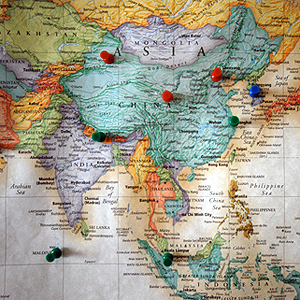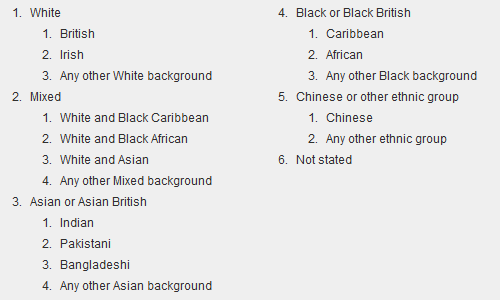I Didn’t Know I Wasn’t Asian
 There is something exemplary in employee recruitment process in the UK. In the application form, it is required that a candidate complete a section, titled ‘Equal Opportunity’, where one can disclose information related to gender and ethnicity. This practice also applies to many activities of the society, e.g. education and health care. Government and officials tally up the numbers and use statistics to analyse whether people are being treated equally. Although it is rather debatable whether the information provided would bring equality — it might as well bring the opposite -, this is indeed a good attempt. If you are interested, you can check this link out; it tells you more about the Equality Act.
There is something exemplary in employee recruitment process in the UK. In the application form, it is required that a candidate complete a section, titled ‘Equal Opportunity’, where one can disclose information related to gender and ethnicity. This practice also applies to many activities of the society, e.g. education and health care. Government and officials tally up the numbers and use statistics to analyse whether people are being treated equally. Although it is rather debatable whether the information provided would bring equality — it might as well bring the opposite -, this is indeed a good attempt. If you are interested, you can check this link out; it tells you more about the Equality Act.
That is about as good as it gets because the form details are rather confusing and even misleading. I was baffled when I was first introduced to the form. It was when I applied to Imperial College in early. Never in my life have I come across a form where I could choose to fill in a field but not to state the information asked. I was given a list of options for ‘Ethnicity’, which looked like the one below.

Note: The list is different in Scotland and Nothern Ireland. The one above is only for England and Wales. You can read this Wikipedia article about Classification of Ethnicity in the UK.
“I’m definitely not White, or Mixed, or Black,” I said to myself.
I really wanted to choose an option and it must not be ‘Not Stated‘. I skimmed through the list and wondered why ‘Chinese‘ was as an exclusive ethnicity and not categorised under ‘Asian‘. I thought it was the Asian of Asians. I watched so many English-language movies and TV shows and the term ‘Asian‘ was always used to refer to an Oriental-looking person, who annoyingly enough was always assumed to be Chinese and Chinese-speaking.
“They are everywhere and constitute nearly 20% of the world population. Maybe that’s why Chinese should be an exclusive entity,” I thought while I was still figuring what to put.
“Well, I’m Indonesian and Indonesia is part of Asia so I must be Asian,” I added.
So I chose ‘Any other Asian background.’ Little did I know that I was not Asian, at least not in this context according to public convention in this country.
Days and months went by and I always chose the same option, with confident, knowing that it would be the way the society would think of me. In January, a shameful event made a headline, two Asians were caught grooming White girls.
It was such a disgrace and everybody disapproved of it. The headline caused massive public condemnation. It got complicated as it also triggered something else, not merely due to the criminal nature of the event, but also a racial issue that was assumed, by some, to be potentially associated. John Straw, former home secretary, a Blackburn MP, jumped in and made racially stereotyping comments and correlated the crime to the origin and the religion of the convicts. But hey, let’s not dwell on this.
It’s not that I wanted to belittle the severity of the crime but I was rather annoyed with the excessive use of the term ‘Asian‘ in the news. The origin of the convicts was quite specific yet ‘Asian‘ was instead used. It was not geographically incorrect but referring to them as ‘Asians‘ could be leading to misconception.
“A hidden world in which Asian men “groom” young white girls for sex has been exposed with the jailing yesterday of two men for child-abuse offences.” - The Times
“However, speaking on the BBC’s Newsnight programme after the case, Mr Straw said vulnerable white girls were at risk of being targeted by some Asian men.” - BBC News
“The police are being blamed for not having done enough to fully address the issue of young girls being groomed for sexual exploitation by Asian men.” - The Guardian
The credibility of the authors and the sources was undoubtly of high standard. If there were a mistake in the use of adjective, it would have been mine. They were all most probably native speakers of English and chances that they were wrong were very, very low. There must be something behind the use of this word that I didn’t know of.
I quickly looked for references online and I stumbled upon this Wikipedia article about British Asian.
“In British English, the term the ‘Asian‘ usually excludes East Asians (see East Asians in the United Kingdom). Britons who mark the ‘Other Asian‘ category on the UK census are normally of Afghan, Iranian, Iraqi, and Yemeni ancestries.” - Wikipedia
I continued to the link suggested by the article and I found this:
“In British English, they (East Asians and South East Asians) are sometimes called ‘Oriental‘. In the British census, the term ‘Chinese or Other‘ is used.” - Wikipedia
“In Anglo America (mostly the United States of America), the term refers most commonly to people of predominantly East Asian and Southeast Asian ancestry; however, in the United Kingdom, the term refers most commonly to South Asians. In other countries (like countries of Continental Europe), the term is applied in a wider sense to all people from Asia or from a number of its regions.” - Wikipedia
To confirm the validity of these citations, I went to two of my friends, an English and an Iranian UK permanent resident, and they confirmed that it was indeed the case.
I was shocked. I nearly could not believe them or everything I found about this little misunderstanding. It was as if my years of learning English were thrown into garbage as I could not understand a word as simple as ‘Asian‘. I tried to think about it and everything seemed to be coming into sense.
‘Chinese‘ is considered a separate entity because the term ‘Asian‘ is publicly used to refer to South Asians only. South East Asian, quite unluckily, appeared to be considered as a small subcategory of Chinese, hence not Asian.
Is it not weird to say “South East Asians are not Asians” yet there is ‘Asians’ in ‘South East Asians’?
Is being greeted with ‘Ni Hao’ not enough that I should properly and legally be classified under ‘Chinese or Other’? How annoying.
After having been for one and a half year in this country, I finally find out that I am not Asian and I have never been. Even though ethnicity is self-identified, in a way the classification has suggested otherwise.
This sort of classification of ethnicity has also attracted controversy in the past: particularly at the time of the Census where the existence and nature of such a classification, which appeared on the Census form, became more widely known than general. (Wikipedia)
Starting 27 March, the Census day, I can ‘officially’ be Asian as the Office for National Statistics are making some changes in the ethnicity classification in England and Wales. They are to put ‘Chinese‘ to where it should be and should have been, which then would make choosing ‘Any other Asian background‘ a lot more sense to me. They are also to introduce a new category, ‘Arab‘, as an exclusive category.
Illustration by unfoldedorigami.

 Indonesia vs. the UK; there’s something essentially different in terms of customer and shopping experience. In Indonesia, we’ve got a little proverb that says “the customer is king”. We are kings. We’re entitled for all the possible treatment of a king: a big, warm, welcoming smile at all time, constant hospitality, unlimited variety of options and perpetual top-notch customer service. The customer is king. Full stop. In the UK, a customer is not always treated like a king, at least not like how an average Indonesian would perceive. People are warm and welcoming but they don’t smile as much. Compared to British sales advisers in general, Indonesian ones look like pre-configured robotic puppets who constantly smile regardless of the situation. That is a bit exaggerated but you know what I mean. However, as I’m thinking more about this, I start to wonder what it really means to be treated like a king.
Indonesia vs. the UK; there’s something essentially different in terms of customer and shopping experience. In Indonesia, we’ve got a little proverb that says “the customer is king”. We are kings. We’re entitled for all the possible treatment of a king: a big, warm, welcoming smile at all time, constant hospitality, unlimited variety of options and perpetual top-notch customer service. The customer is king. Full stop. In the UK, a customer is not always treated like a king, at least not like how an average Indonesian would perceive. People are warm and welcoming but they don’t smile as much. Compared to British sales advisers in general, Indonesian ones look like pre-configured robotic puppets who constantly smile regardless of the situation. That is a bit exaggerated but you know what I mean. However, as I’m thinking more about this, I start to wonder what it really means to be treated like a king. Having lived for around a year in the UK and extensively interacted with people from different countries have revealed some intriguing facts to me. Whenever comes the situation where one has to introduce oneself and make a casual conversation, it appears that it won’t go anywhere but around one’s country of origin. Not only is it always a good topic to begin with, it also translates into an infinite number of possible sub-topics which are useful to prevent awkward and dull moments with new acquaintances. That being said, it often brings up some interesting cultural facts which are always worth noting and remembering.
Having lived for around a year in the UK and extensively interacted with people from different countries have revealed some intriguing facts to me. Whenever comes the situation where one has to introduce oneself and make a casual conversation, it appears that it won’t go anywhere but around one’s country of origin. Not only is it always a good topic to begin with, it also translates into an infinite number of possible sub-topics which are useful to prevent awkward and dull moments with new acquaintances. That being said, it often brings up some interesting cultural facts which are always worth noting and remembering. It’s been more than 2 months since my last blog post and surely many have happened. In April, I graduated from the BSc Chemical Engineering program of Institut Teknologi Bandung and was accepted by Imperial College London to enroll a MSc Petroleum Engineering this October. United Kingdom suddenly look much more tempting and challenging than The Netherlands for me. I did have a little risk-and-benefit analysis and eventually London came up as the winner. Yes, “eventually”, as it did take several months for me to think about this. Delft was good, Eindhoven was even better, but London seems to have some prominent winning factors.
It’s been more than 2 months since my last blog post and surely many have happened. In April, I graduated from the BSc Chemical Engineering program of Institut Teknologi Bandung and was accepted by Imperial College London to enroll a MSc Petroleum Engineering this October. United Kingdom suddenly look much more tempting and challenging than The Netherlands for me. I did have a little risk-and-benefit analysis and eventually London came up as the winner. Yes, “eventually”, as it did take several months for me to think about this. Delft was good, Eindhoven was even better, but London seems to have some prominent winning factors.